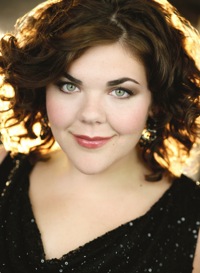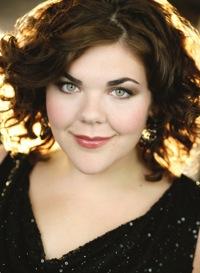
Daveda Karanas set her sights very high. In the midst of preparations for her forthcoming San Francisco Opera performances as Waltraute and Second Norn in Wagner’s Ring, the mezzo-soprano delivered a Schwabacher Debut Recital with pianist/coach Allen Perriello whose centerpiece was Wagner’s five Wesendonck Lieder. The songs, two of which were expressly written as studies for Wagner’s game-changing opera, Tristan und Isolde, are a supreme test of a singer’s ability to infuse lyrical grandeur with intimacy and depth.
The emotional component of the Wesendonck Lieder is crucial. Wagner set the five poems by Mathilde Wesendonck during his clandestine love affair with the writer, who was also the wife of his patron, silk merchant Otto Wesendonck. Given that Wagner fan Otto had put a cottage on his property at the composer’s disposal, it seems that Wagner was taking advantage of far more than the view until his wife, Minna, got wind of the affair.
All of which is to say, there is a vast sea of emotions churning within the Wesendonck songs — emotions that leave the Rhinemaidens’ despair at losing their gold at the start of the Ring seeming almost lightweight by comparison. This is why many of the pre-eminent Brünnhildes, Sieglindes, Isoldes, and Brangänes of the last 150 years — Flagstad, Lieder, Lehmann, Farrell, Crespin, Brewer, Nilsson, Norman, Eaglen, and Ludwig among them — have performed and recorded all or at least some of the songs.
The Goods
In the first half of the recital in Temple Emanu-el’s Meyer Sanctuary, Karanas’ performance of five songs by Liszt and the six songs of Peter Heise’s Gudruns Sorg (Gudrun’s Sorrow) immediately established that she has a gorgeous voice that can easily project over a piano whose lid is open all the way. She produces such a glorious display of primary colors in her upper-middle and high ranges that it is tempting to forget about the words and simply immerse oneself in the sound. No wonder Karanas went from the Merola Opera Program to several years as an Adler Fellow, with a win at the 2008 Metropolitan Opera National Council Auditions giving further boost to her budding career.
Her clear diction was as rewarding as her spoken introductions were delightful. Discussing the sometimes droll connection between Wagner’s Ring; Liszt songs that involve the Rhine — the Lorelei (akin to the Rhine’s mermaidens), a storm (lots of those in Valhalla and below), a Wanderer (as in Wotan), and a ring — and Heise’s cycle based on the Norse legend from which Wagner’s Ring in part is drawn, Karanas was a joy. When a budding artist declares, “Allen is full of knowledge beyond comprehension” and “Heise’s pieces are amazing; they’re kind of great,” you know that she has not let prima donnahood go to her head.
The Not So Goods
Karanas’ performances also raised concerns. Curious for a mezzo, her low range is rather shallow, with (at least at this performance) a marked absence of dark chest tones. Her instrument works wonderfully higher in the range, which it navigates with such ease as to make you wonder if she’s actually a soprano most at home in high mezzo territory. But when a composer intentionally employs low tones to express darkness, grief, and death, a shallow sound simply will not do.
Nor will a persistent shortness of breath that creates such unmusical breaks as, in the song Stehe still! (Stand still!), “urewige Schöpfung, halte [breath] doch sein” (eternal creation, halt!). Certainly there have been other Wagnerians, Lotte Lehmann foremost among them, who did not have the lung capacity to spin endless phrases. But if you must breathe, even in songs that are taken at anything but expansive tempos, breathe at the commas or places that make musical sense, not where it disrupts both textual and musical flow.
Karanas’ interpretive limitations were most apparent in the Wesendonck Lieder. In the first verse of the opening song, Der Engel (The Angel), the lines “die des himmels hehre [awkward breath] Wonne / tauschen mit der Erdensonne” (who would exchange Heaven’s sublime bliss for the Earth’s sun) were delivered straight, with nary a hint of radiance. The transition to the second verse, which expresses a longing, anxious heart silently bleeding and crying, was accomplished with no change of vocal color.
Continuing on, the angel who floated down in answer to the heart’s prayer for release did so without any sense of floating tone. And when that beautiful Angel freed the soul from pain, and lifted it heavenwards in one of Wagner’s most heavenly lyrical outpourings, Karanas supplied nary a hint of transformation or transcendence. The Angel fell flat.
Matters improved not in Stehe still! In addition to three ill-placed breaths, Karanas threw away the ending. The final lines (in translation), “then man recognizes the sign of eternity, and solves your riddle, holy nature!” are momentous; they must be proclaimed with grandeur, as though accompanied by trumpet fanfare or bells resounding at a holy shrine. Karanas sang them as if nothing special had happened. Equally disturbing was Karanas’ inability to tie physical gesture to musical meaning. Self-conscious gazes at the ceiling or supposedly distant shores were best interpreted as cues to close your eyes or look down at the printed words rather than up at the stage. Only when Karanas got going, forgot about looking involved, and poured on her voice into potent displays of undifferentiated emotion, did she seem comfortable in her body.
And Yet ...
It wasn’t all bad. Karanas’ basic tone remained riveting higher in the range, and her high exclamation on the word “glorie” in the fourth song, Schmerzen (Pain), was truly glorious. Nonetheless, she failed to embrace the emotional and spiritual compass of songs that transition from earthly lament to transcendent ecstasy. When two audience members commented afterwards that they found Perriello’s consistently respectful, intentionally understated accompaniment more interesting than the singing, you know that art went wonting.
The big surprise came in the delightful encore, the Gershwins' Lorelei from “Pardon My English” (1933). Every word was not only enunciated clearly and naturally, but also sung with meaning. Karanas may not be a Barbara Cook in the making, but she sure seemed more at home on Broadway than in Rhine country.

